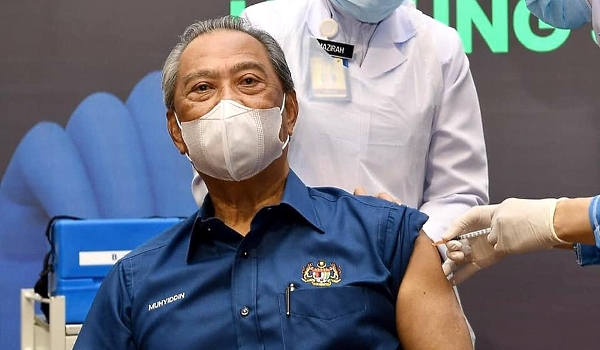Sin Chew Daily
Prime minister Tan Sri Muhyiddin Yassin had Malaysia's first COVID-19 jab at 14:44 yesterday, marking a new milestone in the country's ongoing war against the coronavirus.
Starting from now, our strategy against the virus will no longer be confined just to the passive forms of MCOs, SOPs or RM1,000 fines. We can more proactively take part in the immunization program to shield Malaysians from the threat of the invisible virus.
Health minister Adham Baba said the list of first batch vaccine recipients had been finalized, and the second phase of vaccination would be implemented earlier than the originally scheduled April.
More Pfizer vaccine doses will be arriving while the vaccines developed by four other manufacturers will also arrive here soon. All the vaccines will be deployed to 522 vaccination centers nationwide.
At the same time, things like "vaccine passport" and compensation scheme for individuals suffering from serious side effects from the vaccines, are also in the stage of active planning.
All this points to the fact that the country has already morphed into a state of preparedness with well defined goals, from sheer panic, complete loss and not having a clue how to tackle the virus right in the very beginning.

Looking back at how we did over the past one year, although many are unsatisfied with the government's performance, we should count our blessing the explosive surge in new COVID-19 cases took place only after October, or two months before the vaccines were first made publicly available. Now four months into it, we can finally see hope as the vaccines begin to be shipped in.
PM Muhyiddin has taken his first jab, although that was 78 days after the world's first jab was administered in the UK on December 8 last year.
If we were to experience the explosive growth, say, two or three months earlier, then the situation today could have been a lot worse than the 291k cases recorded so far as of yesterday. We could have recorded 450k cases based on Johns Hopkins University's COVID-19 trend prediction.
Due to the initial oversight of the previous administration, almost 29 million people in the United States, or about 9% of the country's population, have been infected so far, with more than 518,363 deaths.
In a ceremony marking half a million COVID-19 deaths in the White House, President Joe Biden said, "Today we mark a truly grim, heartbreaking milestone: 500,071 dead. That's more Americans who've died in one year in this pandemic than in World War I, World War II and the Vietnam War combined."
Indeed, who with some loved ones killed in the pandemic will not feel heartbroken?
US immunologist expert Dr Anthony Fauci said political divisiveness contributed significantly to the COVID-19 situation in the country, in which wearing a mask has become a political statement rather than a public health measure. He admitted that tackling the virus was tough, as other developed countries like Germany and the UK struggled with the virus despite strong adherence to public health measures.
Therefore, we should be thankful that all parties on both sides of the political divide and ordinary citizens would momentarily put aside their differences and disputes in order to fight the virus in unison.
The UK is one of the most seriously battered nations with 6.1% of its population down with the virus at 4.14 million cases and over 121,000 deaths. The country's economy suffered 9.9% dip last year, the worst slump in over 300 years.
According to Public Health England, hospitalization and death from COVID-19 will be reduced by 75% after the first BioNTech vaccine dose is administered, showing how effective the vaccine is.
In the United States, the daily numbers of new cases and deaths have slowed remarkably following the vaccine rollout. The number of COVID-19 deaths has plunged from an average of 4,000 between last September and January this year, to only about 1,900 today.
The vaccine is by no means a cure-all. Even the most efficacious vaccines can only claim to be 95% effective against the virus, and many are still worrying about the duration of effectiveness and whether the vaccines can deal with mutant variants.
As such, we may still need to faithfully adhere to all the SOPs for probably another year or two even as we have marked a new milestone in our war against the virus.
ADVERTISEMENT
ADVERTISEMENT


































